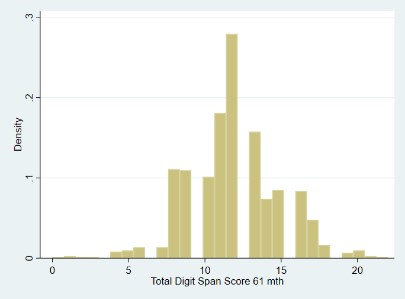The Avon Longitudinal Study of Parents and Children (ALSPAC) assessed their cohort members (CMs) at 61 months’ age (Children in Focus Clinic) using a measure of Short-term Memory (Digit Span Test).
Details on this measure and the data collected from the CMs are outlined in the table below.
| Domain: | Verbal memory |
| Measures: | Short-term memory |
| Memory Span | |
| CHC: | Gsm (Short-term memory) |
| Administration method: | Trained interviewer; clinical setting; questions answered orally |
| Procedure: | The child was presented with a spoken series of digits and asked to recall them immediately in sequence. A practice session was administered first. Sequence lists were then read aloud, beginning with a 2-number sequence. If the child correctly answered the first 3 lists of a particular sequence length, the length of the list was increased by one number. The outcome was the maximum digit span reached. |
| Link to questionnaire: | http://www.bristol.ac.uk/alspac/researchers/our-data/clinical-measures/ (opens in new tab) |
| Scoring: | Max digit span reached (0 - 8) |
| Item-level variable(s): | cf870 - cf877 |
| Total score/derived variable(s): | cf872 |
| Descriptives: | Raw score |
| N = 963 | |
| Range = 0 - 22 | |
| Mean = 11.91 | |
| SD = 2.96 | |
(click image to enlarge) |
|
| Age of participants (months): | Mean = 67.19, SD = 0.8, Range = 65 - 73 |
| Other sweep and/or cohort: | ALSPAC – Age 4 – Short-Term Memory (Digit Span Test) |
| NCDS – Child of CM (Multi-Age) – WISC-R Digit Span Subscale | |
| BCS70 – Age 10 – BAS Recall of Digits | |
| Source: | Gathercole, S. E., & Pickering, S. J. (2000). Assessment of working memory in six-and seven-year-old children. Journal of Educational Psychology, 92(2), 377. |
| Technical resources: | None |
| Reference examples: | Gathercole, S. E., Briscoe, J., Thorn, A., Tiffany, C., & ALSPAC Study Team. (2008). Deficits in verbal long-term memory and learning in children with poor phonological short-term memory skills. The Quarterly Journal of Experimental Psychology, 61(3), 474-490. |
For the named items in the table above, links are provided to their corresponding content on CLOSER Discovery. Where a variable range is provided, full variable lists can be accessed through the ‘Variable Groups’ tab on the linked Discovery page.
Go to:
- Overview of all cognitive measures in ALSPAC
- Overview of childhood cognitive measures across all studies
This page is part of CLOSER’s ‘A guide to the cognitive measures in five British birth cohort studies’.
